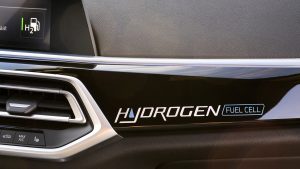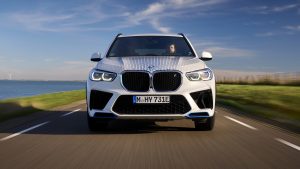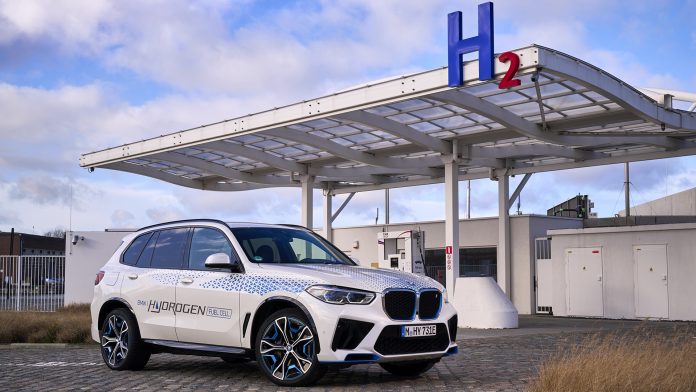The BMW Group has rolled out a pilot fleet of hydrogen vehicles that will operate commercially later this year.
The BMW iX5 Hydrogen vehicles and development project, which is a result of four years of research, is entering its next critical phase. The fleet, which consists of less than 100 cars, is set to be employed internationally for demonstration and trial purposes for various target groups.
This active driving experience will be the first chance for people not involved in the development process to immediately understand what BMW iX5 Hydrogen cars can offer.
According to a report by the International Energy Agency (IEA), hydrogen offers considerable potential as a future energy source in connection with global energy transition activities. Hydrogen can be used for various applications thanks to its storage and transport capabilities.
“Hydrogen is the missing piece when it comes to emission-free mobility”
“Hydrogen is a versatile energy source that has a key role in the energy transition process and, therefore, in climate protection. After all, it is one of the most efficient ways of storing and transporting renewable energies,” said Oliver Zipse, Chairman of the Board of Management of BMW AG.
“We should use this potential also to accelerate the transformation of the mobility sector. Hydrogen is the missing piece in the jigsaw when it comes to emission-free mobility. One technology alone will not be enough to enable worldwide climate-neutral mobility.”
The BMW iX5 Hydrogen cars were developed based on the current BMW X5 and were first unveiled as a concept at the IAA show in 2019. Initial prototypes were then made available at the IAA Mobility 2021 for visitors to experience in action as shuttle vehicles.
The vehicle’s hydrogen fuel cell system showcases the BMW Group’s leading development expertise in electric drive technologies. The BMW Group is pushing forward with the development of hydrogen fuel cell technology as an additional option for locally emission-free individual mobility in the future.
The BMW Group produces the high-efficiency fuel cell systems at its in-house competence centre for hydrogen in Munich. This technology is one of the core elements in the BMW iX5 Hydrogen vehicles, generating a high continuous output of 125 kW/170 hp.
How is BMW ensuring the hydrogen vehicles operate efficiently?
A chemical reaction occurs in the fuel cell between gaseous hydrogen from the tanks and oxygen from the air. Maintaining a steady supply of both elements to the fuel cell’s membrane is crucial for the drive system’s efficiency.
In addition to the technological equivalents of features found on combustion engines, such as charge air coolers, air filters, control units, and sensors, the BMW Group also developed special hydrogen components for its new fuel cell system. These include a high-speed compressor with a turbine and a high-voltage coolant pump.

The fuel cells, which are acquired from Toyota Motor Corporation, are manufactured in two main steps based on the individual fuel cells. The cells are first assembled into a fuel cell stack; then, all the other components are fitted to produce a complete fuel cell system to ensure the hydrogen vehicles operate efficiently. For this, molten aluminium is poured into a mould made from compacted sand mixed with resin in a process specially designed for these small-series hydrogen cars.
The final assembly of the fuel cell stacks includes a voltage test and extensive chemical reaction testing within the cells. Finally, all the components are fitted together in the assembly area to produce the complete system. During this system assembly stage, further components are fitted, such as the compressor, the anode and cathode of the fuel-cell system, the high-voltage coolant pump and the wiring harness.
Combined with a highly integrated drive unit using fifth-generation BMW eDrive technology at the rear axle and a powerful battery with lithium-ion technology developed especially for these hydrogen vehicles, the powertrain channels maximum output of 295kW / 401 hp onto the road. In coasting overrun and braking phases, the motor also serves as a generator, feeding energy back into a power battery.
Production progress at the Munich power plant
The BMW iX5 Hydrogen vehicles are being built in the BMW Group’s pilot plant at its Research and Innovation Centre (FIZ) in Munich.
This is the interface between development and production, where every new model from the company’s brands is made for the first time. Around 900 people work in the body shop, assembly, model engineering, concept vehicle construction, and additive manufacturing departments.
In the case of the BMW iX5 Hydrogen cars, specialists in hydrogen technology, vehicle development, and initial assembly of new models have worked closely together to integrate the cutting-edge driving and energy storage technology.
Hydrogen allows for rapid re-fuelling
The hydrogen needed to supply the vehicle’s fuel cell is stored in two 700-bar tanks made of carbon-fibre-reinforced plastic (CFRP). Together these hold almost six kilogrammes of hydrogen, enough to give the BMW iX5 Hydrogen vehicles a range of 313 miles in the WLTP cycle.

Filling up the hydrogen tanks only takes three to four minutes; therefore, these hydrogen cars can also provide the driving pleasure for which BMW is renowned over long distances, with just a few short stops along the way.
In the transport sector, hydrogen can become a further technology option, alongside battery-electric mobility, for shaping sustainable individual mobility in the long term.
The BMW Group welcomes and supports activities to promote innovation in Germany and Europe that will help build a hydrogen economy and accelerate the production of green hydrogen. These include the large-scale hydrogen projects classified as Important Projects of Common European Interest (IPCEI).







